ESG Topics A-Z
Packaging

To PepsiCo:
PepsiCo relies on diverse packaging solutions to deliver products to our customers and consumers without compromising food safety or quality. When designed sustainably, packaging solutions can contribute to the creation of a circular value chain and potentially help reduce our greenhouse gas (GHG) emissions. PepsiCo's sustainable packaging vision is to build a world where packaging never becomes waste.
To the World:
When packaging is disposed of improperly, it may end up as waste in the marine environment or on land, impacting both human health and the health of the environment. This global issue requires a systemic shift to more sustainable solutions for delivering products to consumers through multi-stakeholder collaboration and active engagement within the value chain.
Approach
Packaging plays an essential role in safely delivering our products to customers and consumers. We design our packaging to balance several critical criteria, including compliance with food safety regulations, maintaining quality of the product, environmental sustainability, affordability and consumer preferences, including convenience. Through our pep+ (PepsiCo Positive) agenda, we are working to make every stage of our value chain more circular and to tackle significant global packaging challenges through innovation, re-design, policy advocacy and infrastructure investment. Our sustainable packaging efforts support our pep+ ambition to create a Positive Value Chain by contributing to more circular and sustainable systems and providing our consumers with innovative solutions and business models.
Our sustainable packaging vision
PepsiCo’s sustainable packaging vision is to help build a world where packaging never becomes waste. We take a three-pronged approach to realizing our vision:
- Reducing the amount of packaging we use;
- Supporting recycling and a circular economy for recycled materials; and
- Reinventing how we deliver products through exploring low-packaging formats, reuse models and the use of alternative packaging materials such as non-plastic and compostable options.
Through each of these three pillars, PepsiCo aims to lead change through active collaboration and stakeholder engagement.
The challenges in this journey are significant and complex, and we are facing global and systemic obstacles along the way. We know that no one company or industry can create a circular economy on its own. Sustainably managing our packaging requires comprehensive solutions, many of which are complex and hinge on significant systemic transformations such as improved infrastructure, policy or consumer engagement. We are working together with our stakeholders, including governments, NGOs, suppliers, customers, peer companies, consumers and more to find scalable solutions. To achieve these transformations, multi-stakeholder collaboration and action-oriented engagements within the packaging value chain are needed. This will not only help us, but also further help build a circular economy for packaging that benefits us all.
We believe long-term transformation requires agility to identify what’s working, what isn’t, and adjust our approach to focus on areas where we can have the greatest impact. We regularly review our sustainability goals and initiatives and consider changes that are from time to time warranted, including in the context of new developments, such as business growth, necessary investments relating to our initiatives and external developments.
Our packaging goals — updated in 2025 — focus on the key markets where we believe our efforts can make the most positive impact and better account for external factors outside of the company’s control. By prioritizing efforts in these key markets, continuing work to reduce our use of virgin plastic,1 increasing incorporation of recycled content1 and improving the design of our packaging,2 PepsiCo plans to focus on investments that aim to improve the packaging lifecycle.
Our goals remain ambitious and will continue to require investment, innovation and cross-sector collaboration to drive systemic change and support the business. At the same time, challenges remain. For example, India only passed laws allowing rPET for beverage packaging in 2023, with food packaging added this year, while other countries do not allow rPET inclusion in food-grade packaging. Well-designed collection and recycling policies, such as Extended Producer Responsibility (EPR) programs, are still lacking in many parts of the world.
For our primary plastic packaging in key packaging markets, our goals are:
- Achieve an average of 2% year-over-year reduction in our absolute tonnage of virgin plastics through 2030.1
- Use 40% or greater recycled content in our plastic packaging by 2035 or sooner.1
Beyond our primary plastic packaging, we are striving to:
- Achieve 97% or greater reusable, recyclable or compostable (RRC)2 packaging by design by 2030 in our primary and secondary packaging in our key packaging markets;
- Invest to increase recycling rates in our key packaging markets; and
- Develop and support innovation, in collaboration with our partners and external organizations, of new packaging material technologies and solutions.
pep+ in context: Packaging
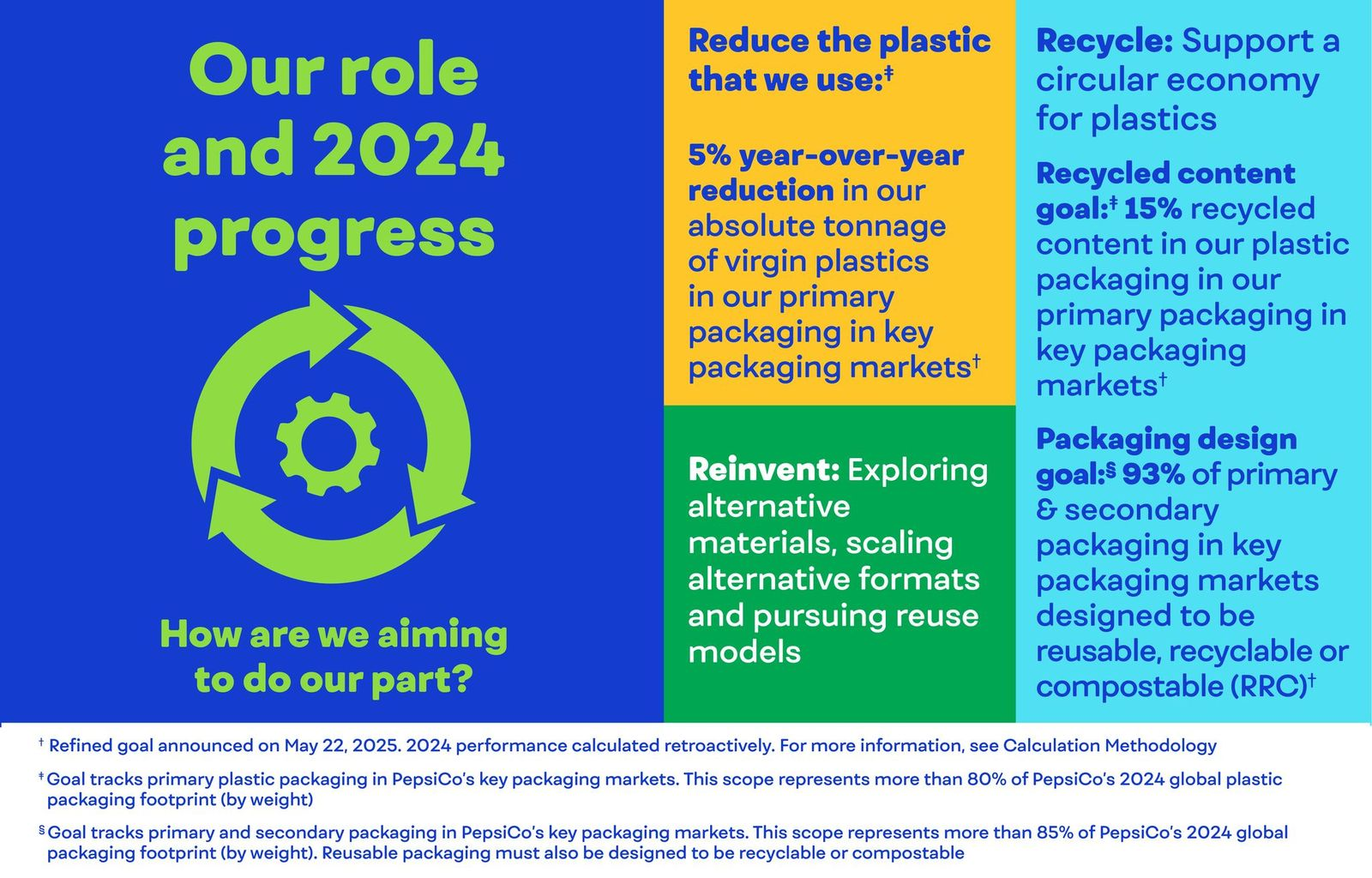
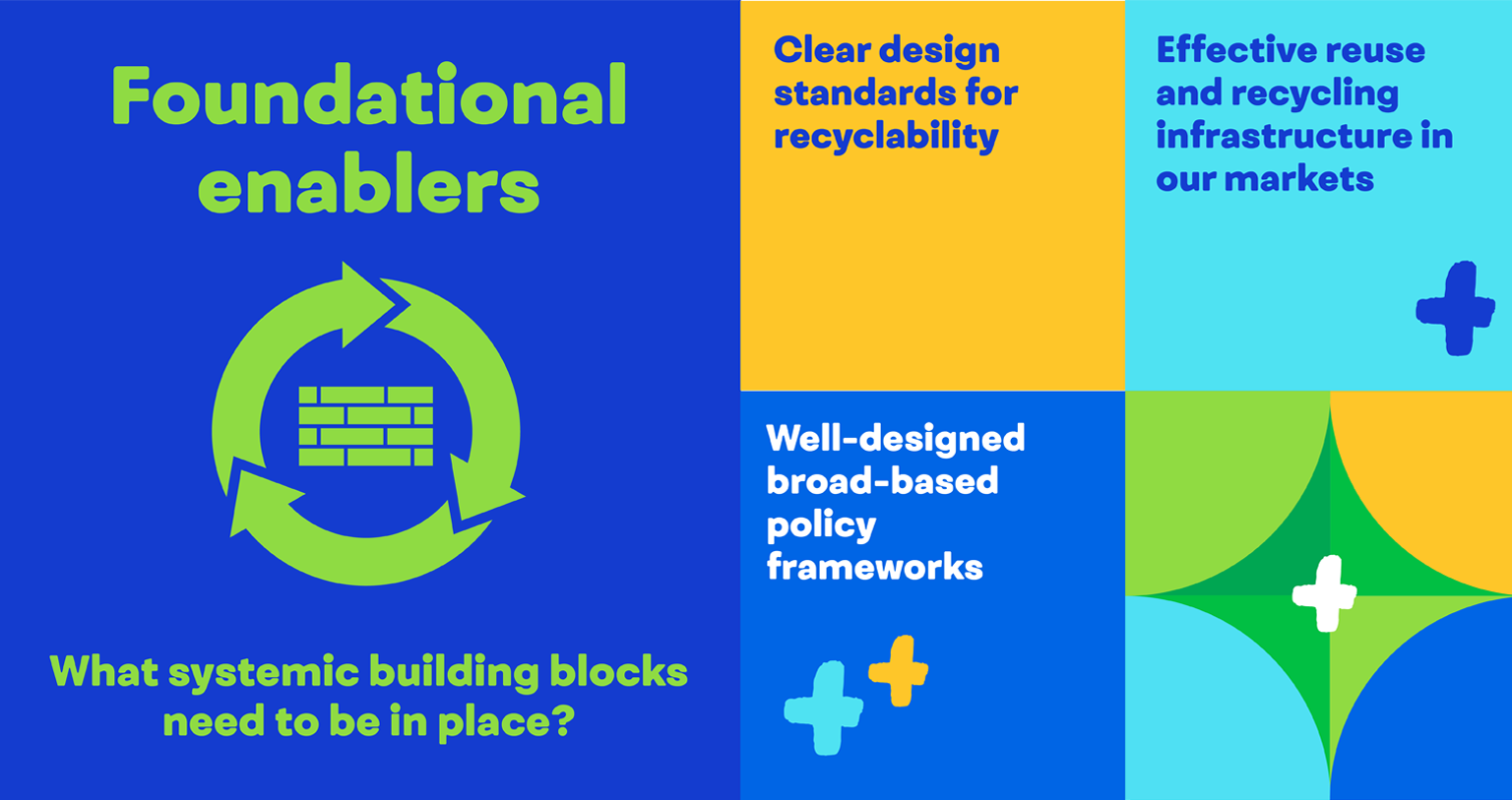
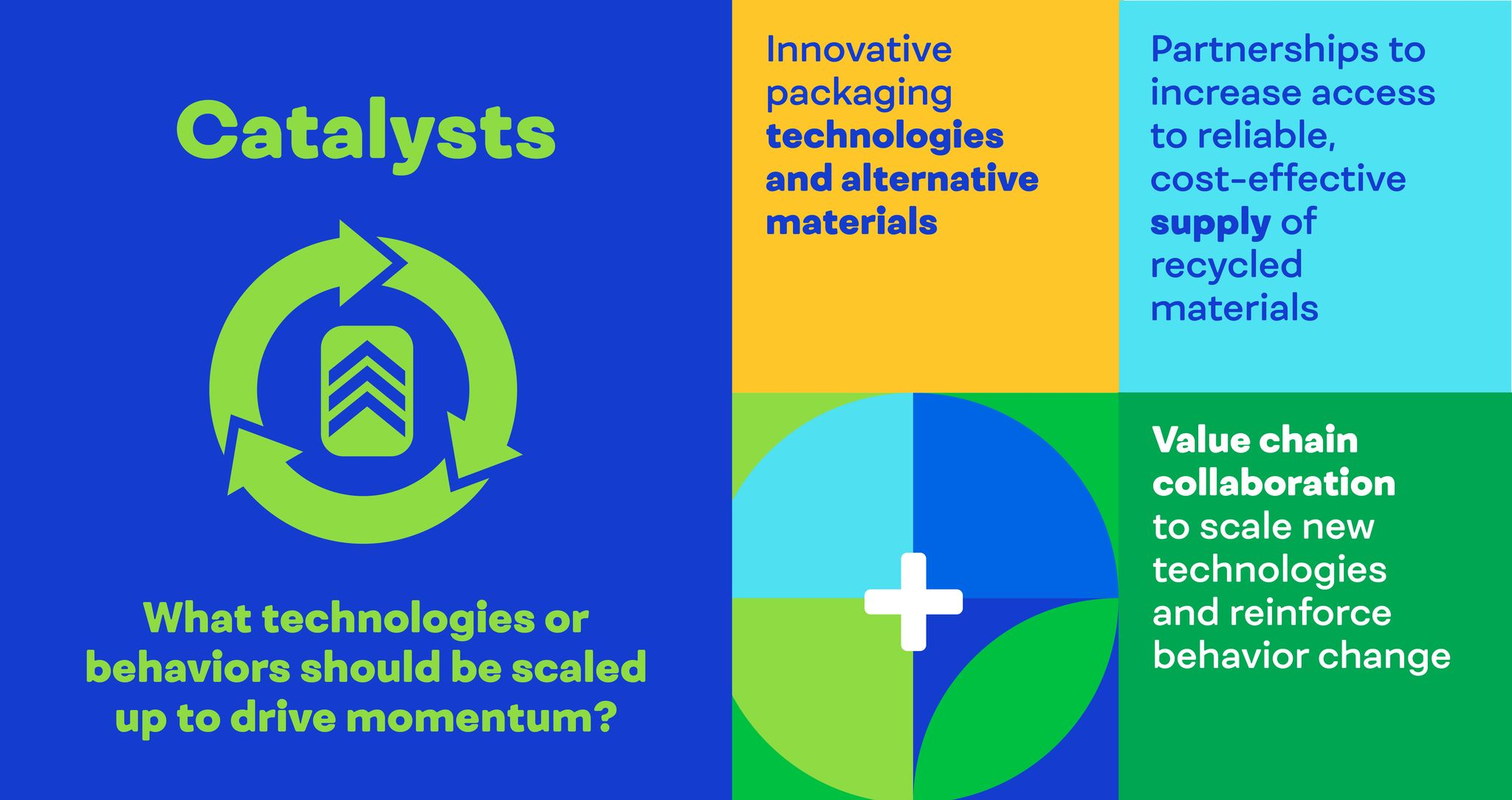
Reduce: use less packaging
Reducing plastic packaging supports our climate ambition by decreasing the amount of virgin, fossil-fuel based plastic we put on the market. To reduce plastics across primary packaging, we have made progress in light-weighting our bottles and other packaging materials. Our Research and Development teams continue to explore and roll-out technology to improve packaging for snacks products, including pre-settling our snacks products in order to use a smaller bag for the same amount of product and introducing new packaging materials.
Recycle: support a circular economy for plastic
Designing for circularity
We aim to design 97% or more of our primary and secondary packaging in our key packaging markets to be reusable, recyclable or compostable (RRC) by design by 2030.2 Our RRC definitions consider guidance from, among others, the New Plastics Economy, the U.S. Federal Trade Commission Green Guides, Association of Plastics Recyclers and European PET Bottle Platform.
Incorporating recycled materials
Achieving circularity for PET and other plastics is contingent on both demand and supply. Robust demand increases material value and creates market pull, which helps unlock new supply. We have set our recycled content incorporation ambition to send such a demand signal and help drive towards circularity.
Supporting recycling systems
Once enjoyed, the packaging from our products should be collected and recycled where possible for another use to create a more circular economy. Increasing collection and recycling rates supports a circular economy by promoting the recovery of the materials we put into the market, preserving their value and aiming to prevent the materials from ending up as litter in the environment or in landfills.
We recognize that, while we cannot change recycling and recovery rates on our own, we have a role to play in optimizing recycling systems through advocacy, investments and collaboration. We seek to improve collection and recycling through policy and voluntary programs supporting infrastructure, consumer education and stakeholder engagement to increase recycling rates. In these efforts, we focus on our key packaging markets – areas where our products are enjoyed most frequently and where relationships in the market enable us to engage effectively.
As we work to support recycling systems, we also strive to promote a safe and inclusive waste management system for those working informally in the waste sector. The informal waste sector exists across the globe, filling the gap where formal collection and recycling systems are lacking. Informal waste sector workers, such as waste pickers, often operate in unsafe conditions, without employment benefits accorded to those in formal employment, and may experience income disparity. To that end, PepsiCo has signed onto the Fair Circularity Initiative to help protect and respect the livelihoods, health, labor and human rights of these workers.
Reinvent: improve the packaging and materials that we use
PepsiCo’s reinvention efforts focus on improving the environmental impact of our packaging by developing and supporting packaging innovations and new technologies. Such innovations can include plastics from non-food, plant-based sources and compostable options, paper-based alternative packaging formats as well as reuse models.
Using alternative materials
PepsiCo is a member of several consortia, collaborations and working groups that aim to develop and sustainably scale innovative packaging solutions. These include co-founding the Composting Consortium. The group is managed by the investment firm Closed Loop Partners and aims to define best practices within the compostable packaging value chain, test various composting technologies, identify enabling environment factors that support the industry’s development and outline the business case for greater investment in this emerging space.
Scaling alternative formats
We are expanding our offerings of powders and concentrates for our beverage portfolio, which enable consumers to make their own drinks at home or on the go without the need for single-use bottles.
Pursuing reuse models
We are continuing to reinvent our offerings to deliver high-quality drinks through reusable formats. These models aim to help us decouple business growth from virgin plastic use and, over time, decrease GHG emissions. Informed by the Ellen MacArthur Foundation’s reuse framework, we are pursuing multiple approaches to scale reuse, including:
- Expanding SodaStream®;
- Building out our returnable plastic and glass bottle offerings in collaboration with PepsiCo bottlers; and
- Driving adoption of reusable cups for our fountain drinks.
Governance
A dedicated team led by our Vice President of Sustainable Packaging manages PepsiCo’s sustainable packaging programs. The team reports to the PepsiCo Executive Committee (PEC) through our Chief Sustainability Officer, but partners closely with many internal functions including Global Procurement, Corporate Affairs, Research and Development, Marketing and our Human Rights Operating Council. Together, the cross-functional team monitors and evaluates packaging challenges, progress and goals on an ongoing basis and shares information for review by our PEC as well as the Sustainability and Public Policy Committee of our Board of Directors on at least an annual basis.
PepsiCo publicly discloses key packaging metrics and progress towards our goals. In addition to the information about our packaging strategy and progress covered here, on our ESG Summary and in our annual report, we report annually through the Ellen MacArthur Foundation’s New Plastics Economy Global Commitment Progress Reports. As part of a regular review process, our team is assessing our Packaging Policy to ensure we align with scientific advancements, business growth and stakeholder expectations.
Constructive policy engagement and advocacy
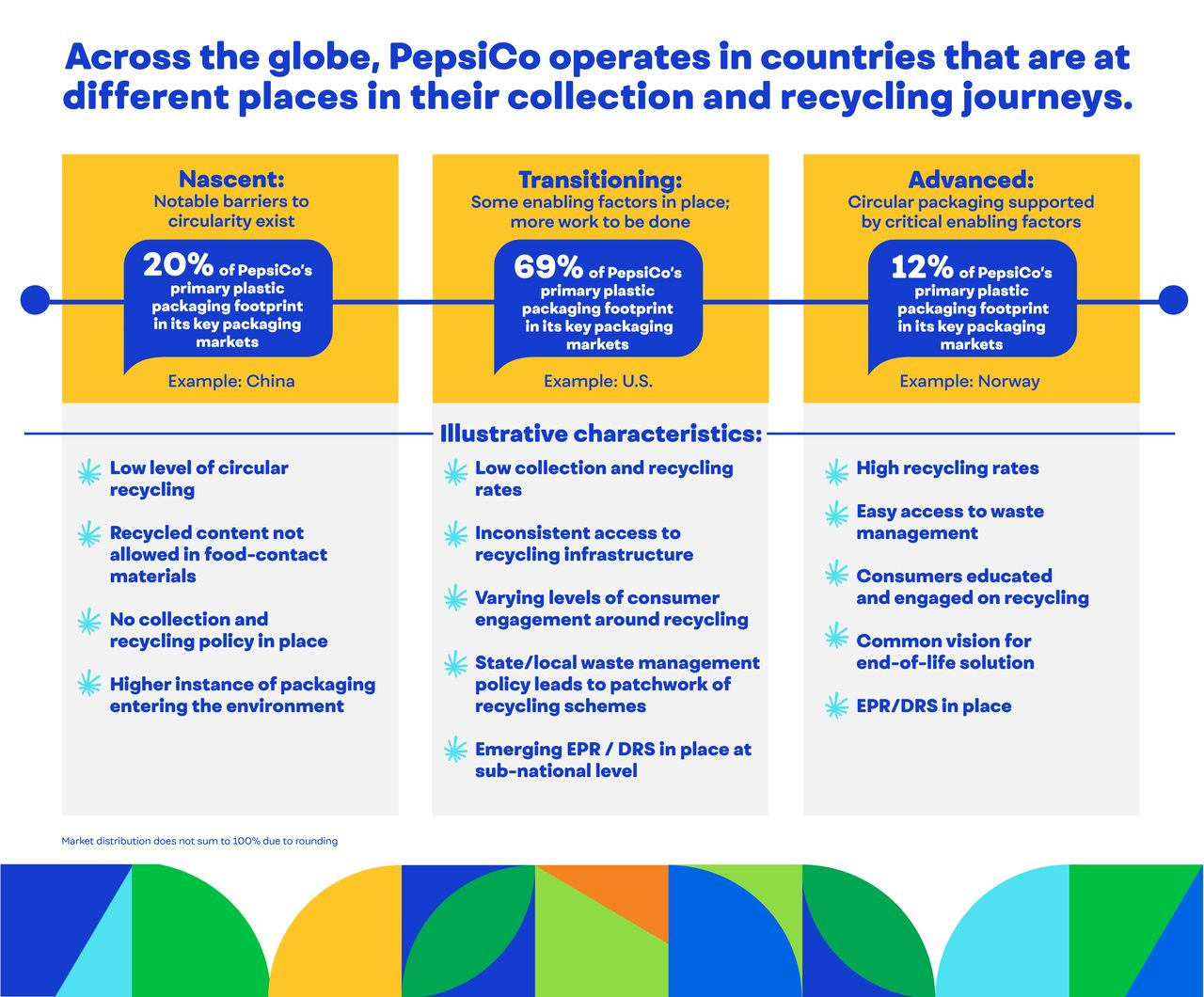
Our reach extends to customers and consumers in more than 200 countries and territories around the world. As a global company with strong local connections, we navigate a wide range of packaging regulations, market conditions and consumer behaviors. Recognizing both the valuable role public-private partnerships can play in improving waste management and promoting the efficient use of valuable resources and the unique needs of each community where we operate, we engage stakeholders on the local, national, and global level.
We believe it is important for PepsiCo and other industry members to engage proactively and constructively in policy discussions. We actively support policy proposals that are broad based, deliver positive environmental outcomes, provide incentives for sustainability and allow us to contribute to the design and implementation of the programs. Our vision demands action and investment from all stakeholders — consumers, participants within the packaging value chain and local, state and national governments.
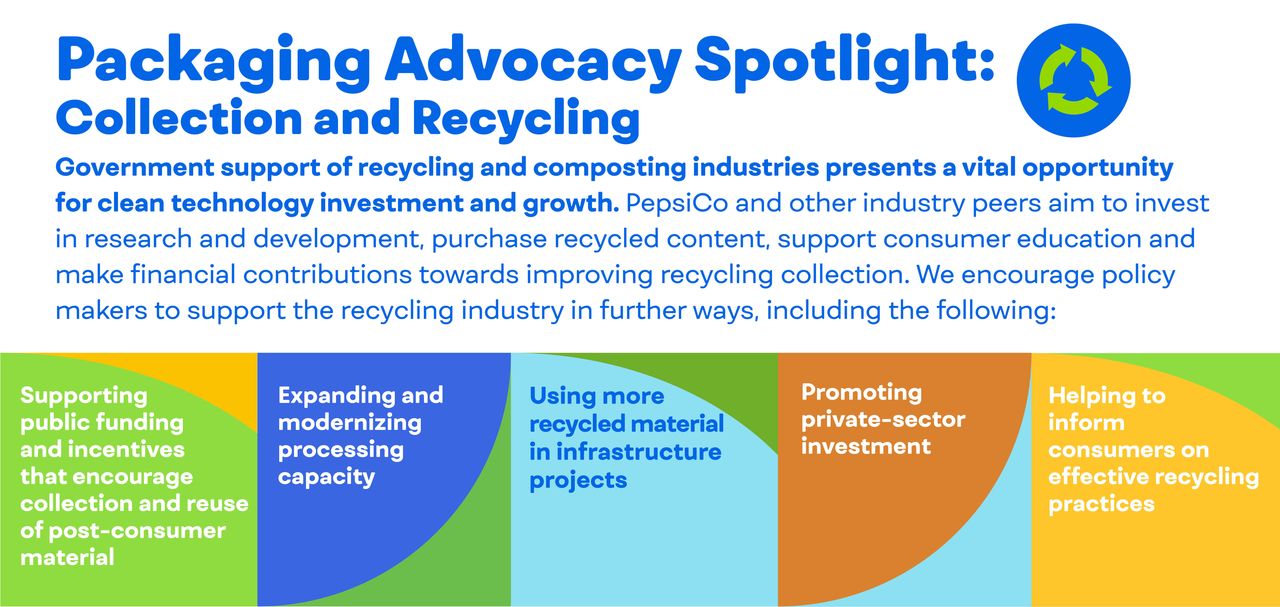
We participate in public policy dialogues to share our expertise on key issues that support our business strategy and, where we can, contribute ideas that help our business, our consumers and society work towards building a circular economy. Packaging policy was again among our key policy issues in 2024. In particular, we engaged on:
Extended Producer Responsibility
We actively advocate for policies, at global, national and local levels, that promote a circular economy for packaging, including well-designed Extended Producer Responsibility (EPR) programs managed by the industry with government oversight. EPR programs extend producers’ responsibility for end-of-life management of products and, if properly designed and funded, can provide meaningful support for collection and recycling, as well as upstream measures such as design. PepsiCo has extensive experience participating in EPR programs in different parts of the world, and we use our experience and insights to deliver constructive recommendations when such programs are being pursued or developed.
Our view is that EPR programs function best when input, cooperation and funding come from key stakeholders. We actively engage with the industry to develop useful guidance on best-in-class EPR program design, such as the guidance put forward by the Consumer Goods Forum Coalition of Action on Plastic Waste. We also collaborate with a broad range of key stakeholders around the world, including NGOs and other industry actors, to promote a better understanding of where and how EPR programs may work best. Additionally, we are engaged in standing up EPR programs, including through our collaboration with Circular Action Alliance in the U.S. In 2024, we helped to set up a voluntary EPR program for the collection and recycling of flexible packaging in Thailand.
Global Plastics Treaty
PepsiCo is a member of the Business Coalition for a Global Plastics Treaty, advocating for an ambitious United Nations (UN) global agreement to end plastic pollution. We believe a treaty that addresses the full lifecycle of plastics, with upstream and downstream measures, will help accelerate progress towards a more circular economy, bolster the local economy, and help keep plastic out of the environment. In particular, we believe that policies such as well-designed EPR, underpinned by common global principles, have an important role to play in a future agreement.
We know working towards more sustainable packaging solutions is a complex endeavor — one that will require collaboration from national, state and local governments, the private sector, NGOs and others. This, coupled with effective and well-designed policy, will support a shift towards a circular economy. PepsiCo is supportive of global action and is dedicated to being part of the solution.
Progress
Our 2024 ESG reporting suite, which includes this ESG Topics A-Z page and our ESG Summary, represents the first time we are reporting progress against our evolved packaging goals.
In 2024, we used 2.1 million metric tons of plastic in our key packaging markets, including primary and secondary packaging.
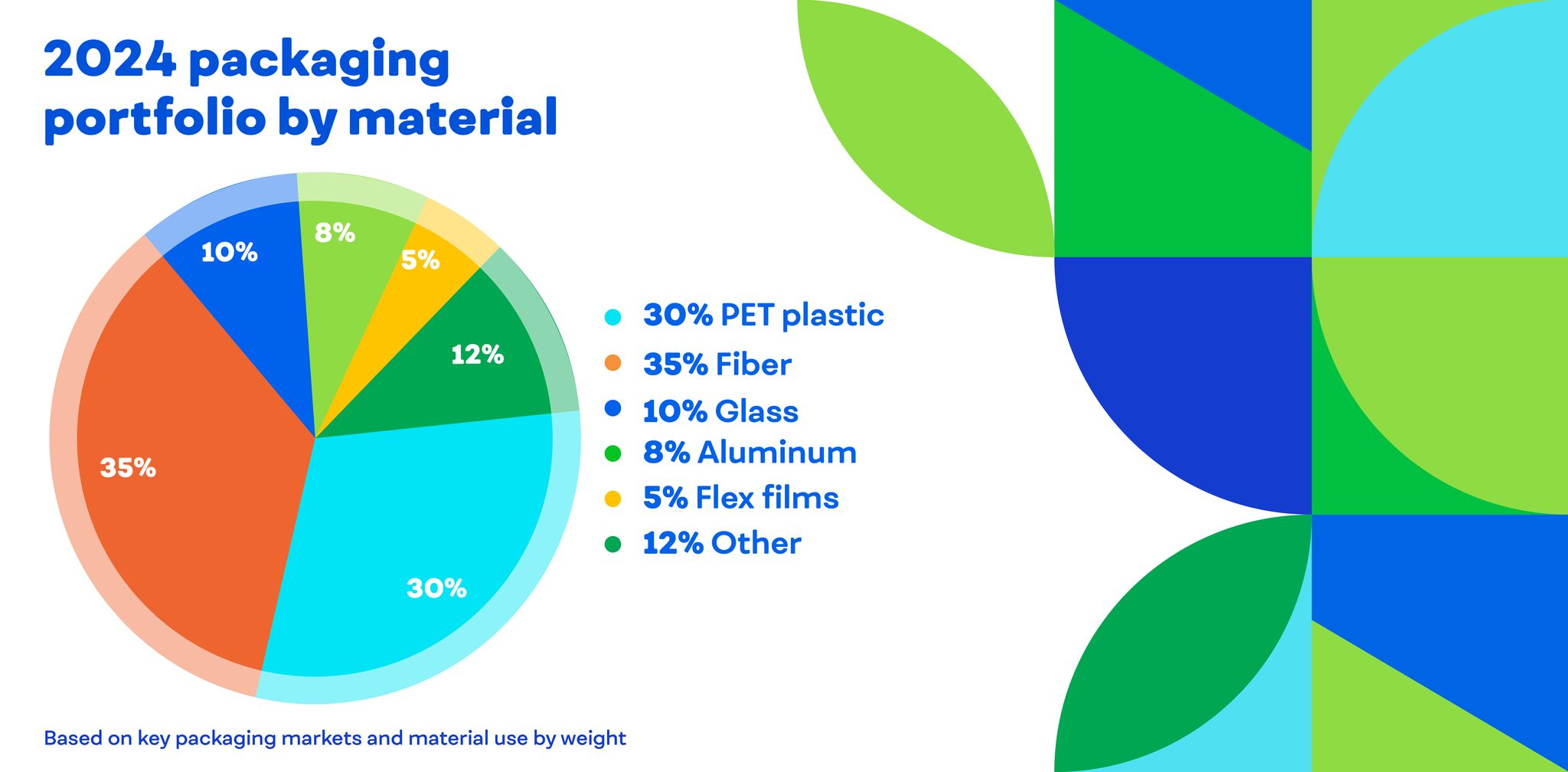

Challenges
- Significant markets, including China, do not currently allow recycled materials in food-grade packages presenting challenges to virgin plastic reduction and recycled content incorporation.
- Inadequate infrastructure and low recycling rates in some regions make collection and recycling of packaging difficult and increase the likelihood of packaging leaking into the environment. In particular, broader systemic changes in technology and infrastructure are necessary to facilitate the circularity of flexible film packaging.
- Competition for the limited supply of high-quality recycled materials makes it difficult to meet our demand for recycled content in our plastic packaging.
Reduce: reduce the plastic that we use
Though tackling our packaging goals comes with a unique set of challenges, we continued to work toward our ambitions in 2024. We achieved a 5% reduction in our absolute tonnage of virgin plastics in our primary packaging in our key packaging markets between 2023 and 2024.3
Within our convenient foods business, we are implementing new technology to change the way we package our foods. In 2024, we reduced the plastic used in packages for Quaker® cereals in Brazil by switching the pouches from plastic to paper.
Recycle: support a circular economy for plastic
Designing for circularity
In 2024, 93% of our primary and secondary packaging in our key packaging markets was designed to be RRC.3 We continued work to design RRC products across the globe during the year, including by:
- Changing the color of Mountain Dew® bottles in Pakistan from dark green to light green in line with local recycling standards;
- Moving from whole-bottle shrink labels to partial-bottle wrap labels for Pepsi® Black in China; and
- Transitioning to paper packaging for Snack A Jacks® multipacks in the U.K. The new outer bag can be widely collected for curbside recycling collection.
While we work to phase out materials that are challenging in the recycling process, such as non-recyclable labels, we continue searching for solutions to improve the recyclability of flexible foods packaging and to increase consumer access to recycling.
Incorporating recycled materials
Across our key packaging markets, we used 15% recycled plastic in our primary plastic packaging in 2024.3 In all, approximately 60 markets had at least one PepsiCo product with rPET in its packaging in 2024. Efforts contributing to this progress include:
- Introducing the first 100% rPET carbonated beverage bottle in Taiwan with 7UP®; and
- Introducing the first energy drink in India with an rPET bottle for Sting®.
In late 2023 in our convenient foods business, we launched Sunbites® packaging in the U.K. with a snack bag made from 50% recycled content from chemical recycling technology sourced using a mass balance approach.
Improving recycling systems
As we work to contribute to a circular economy, we have supported collection, recycling and composting systems. We have worked with a variety of industry participants to drive improvements in both the formal and informal recycling economies.
In 2024, we announced a new collaboration with Intuitive AI to offer the Oscar Sort AI recycling and sortation system in high-traffic areas across the U.S. Oscar Sort has been deployed at several PepsiCo office locations and will be launched at select customer locations in the coming months, potentially including universities, airports, malls and stadiums.
Oscar Sort identifies materials and guides users to the correct bin to aid in proper disposal, improving overall recycling accuracy. The technology behind Oscar Sort is capable of detecting organic remnants in food containers, guiding people to pour out their liquids, and providing precise disposal instructions for virtually any common materials that are ready to be discarded. Oscar Sort's interactive digital display gamifies the experience by providing rewards to users who recycle correctly and provides real-time feedback to educate consumers.
Alongside industry peers, in 2023, we invested in Circular Services, a developer launched by Closed Loop Partners (CLP) and Brookfield Renewable, whose goal is to build recycling facilities that will enable U.S. cities to abandon the costly practice of dumping waste in landfills by ensuring that valuable commodities are recycled and reused in domestic supply chains.
We continued our work with the Fair Circularity Initiative (FCI) — launched in 2022 — where we work with peers and NGOs to support a set of principles to guide corporate engagement with the informal waste sector and work towards a fairer circular economy. Internally, a cross-functional group is developing a holistic strategy to implement these principles through internal guidance, on the ground projects and multi-stakeholder initiatives.
One such example is the Purna Project in India. Through this project, funded by PepsiCo India, the team has focused on efforts to improve ownership of waste, recognition and dignity as well as health and hygiene of the waste pickers, professional benefits and growth and entrepreneurship opportunities. We will use learnings about operationalizing FCI principles from this and other similar projects to inform our approach as we identify projects to help improve livelihoods of waste pickers and help increase collection of our packaging materials.
In addition to work in communities, we continue to improve recycling capabilities at our own facilities. In 2024, we launched a foods packaging collection program with a recycling consortium at our Plano, Texas offices. Beyond our offices, we launched the Positive Packaging Outcomes Fund, a program for funding internal projects aimed at progressing our sustainable packaging goals. In 2024, we established collection programs for increased recycling in Mexico, Brazil and Uganda.
Reinvent: improve the packaging and plastic that we use
We are continuing to grow our portfolio of alternative materials in our convenient foods portfolio and “beyond the bottle” models for our beverages.
Alternative materials
We announced in 2023 that we plan to transition to paperboard packaging to replace plastic rings in North America — which was completed for Canada in 2024. The new packaging is easy to implement on shelf for customers, has consumer-friendly branded-design and is made from recyclable materials.
In our convenient foods business, we launched the first product packaging containing rNEW, a bio-based and renewable plastic in primary flexible packaging in Mexico. rNEW is derived from castor beans. Our use of this material marks the beginning of the inclusion of new resins in foods packaging in our Latin American operating segment, and we aim to continue expansion within the segment in 2025.
Reuse
Reuse models used in our beverages business include, but are not limited to, SodaStream®, fountain beverages delivered in reusable containers and returnable glass and plastic bottles sold to customers. In 2024, we launched Gatorade® glass bottles in Guatemala.
PepsiCo is leveraging collaboration to identify reuse solutions within the value chain and advocate for smart policies. We continued engagement with the Closed Loop Partners NextGen Cup Consortium, a multi-year industry-led group working to accelerate learnings and action on reusable cups in food service. In 2024, we joined forces with Starbucks, The Coca-Cola Company and other major brands to launch the Petaluma Reusable Cup Project, a powerful initiative led by the NextGen Consortium that aimed to make reuse the norm across an entire U.S. city. In total, eight PepsiCo customers functioned as both a cup outlet and/or return location. In addition to collecting over 200,000 cups for reuse, the pilot program provided key insights into what may be required to improve collection and consumer participation in future reuse initiatives.
Strategic collaboration
Sustainable packaging transformation requires collaboration and comprehensive solutions across the entire value chain, particularly in the areas of infrastructure, policy and new material technologies. To move toward a circular economy for packaging, all actors in the packaging value chain, including packaging producers, retail and sales outlets, waste management and recycling industries, governments and consumers will need to work together collectively. To this end, PepsiCo engages in a variety of programs and initiatives that aim to bring stakeholders together in an effort to create broad solutions in order to shift the system in a more sustainable direction. Due to the breadth of our global, regional and local relationships, we cannot list every initiative in all markets and focus here on a representative sample of our work and commitment to collaboration.
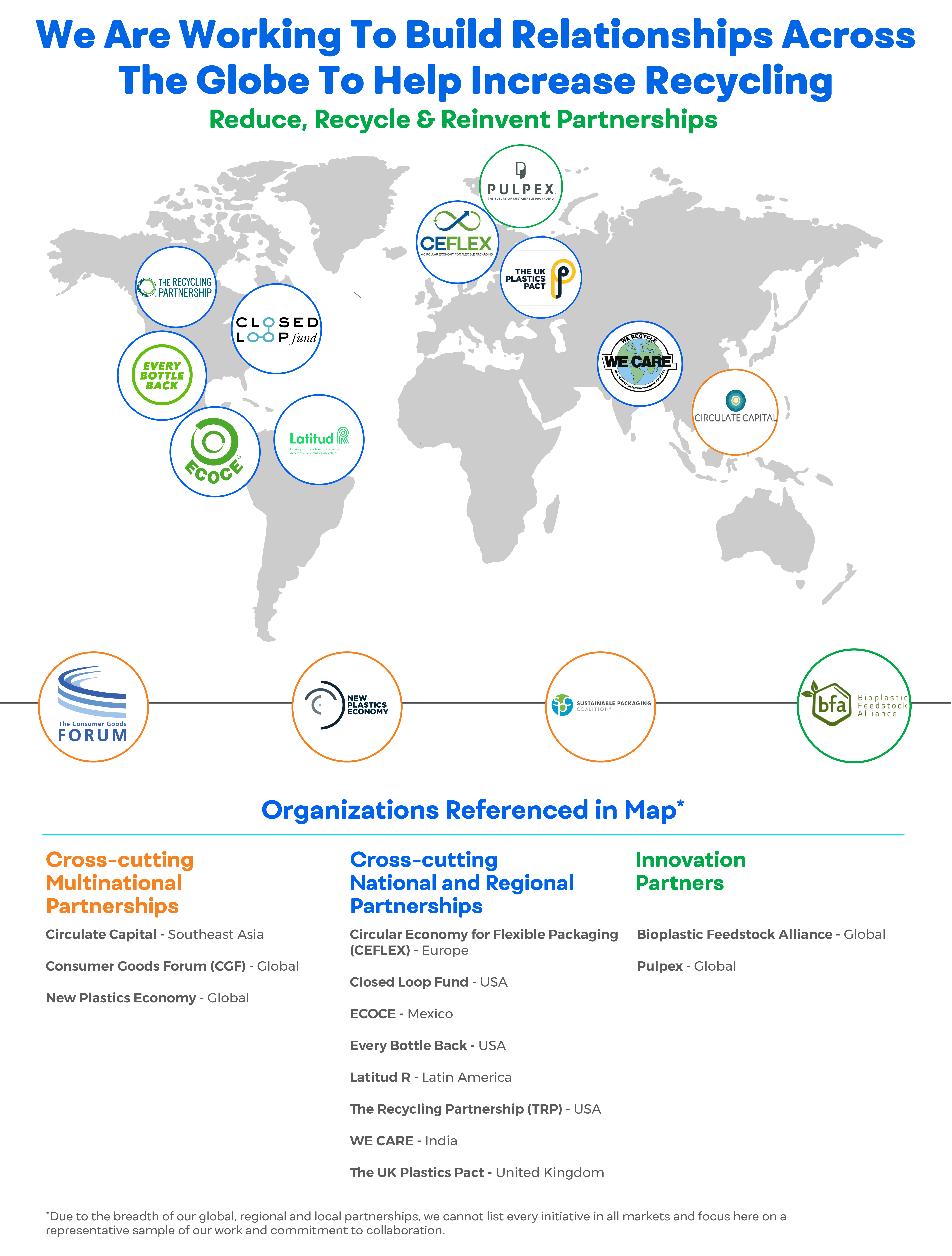
What's next?
PepsiCo is looking to further several key initiatives:
- Infrastructure: We plan to continue to accelerate investments in collection, sortation and recycling infrastructure in key packaging markets, explore opportunities to empower waste collectors and support the implementation of new EPR programs.
- Relationships: We plan to continue to build coalitions and collaborate in support of improved collection practices, material development consortia and smart policies that enable the circular use of materials and build relationships to empower our consumers to make sustainable choices through education.
- Alternative materials: We are continuing to develop the supply chain to bring compostable, renewable and paper-based materials and recyclable packaging solutions to scale.
- Design: We are exploring scalable technologies that allow us to reduce the volume of virgin plastic in our packaging, while continuing to design for improved recyclability of our materials.
- Advocacy: Through the UN treaty to end plastic pollution negotiations, we plan to continue to advocate for supportive policy solutions and effective global rules aimed to drive towards circularity. Additionally, at the national level, we continue to advocate for well-designed EPR programs and engage in dialogue with policymakers on our experience from participating in EPR to shape program design and implementation efforts.
1Goal tracks primary plastic packaging in PepsiCo’s key packaging markets. This scope represents more than 80% of PepsiCo’s 2024 global plastic packaging footprint (by weight)
2Goal tracks primary and secondary packaging in PepsiCo’s key packaging markets. This scope represents more than 85% of PepsiCo’s 2024 global packaging footprint (by weight). Reusable packaging must also be designed to be recyclable or compostable
3Refined goal announced on May 22, 2025. 2024 performance calculated retroactively. For more information, see Calculation Methodology
Related topics
Climate change, Deforestation, Green Bond, Human rights, Sustainable product design, Waste
Downloads
Last updated
August 28, 2025